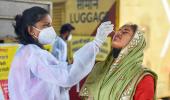Amid a resurgence of COVID-19 cases in Southeast Asia and parts of Europe, experts in India feel that given the high vaccination coverage and immunity due to natural infection, any future waves are unlikely to have a major impact in the country.

Some of them even said that the government should consider relaxing the mask mandate as the daily COVID-19 cases and deaths have remained low for a while.
India on Sunday recorded 1,761 fresh COVID-19 cases, the lowest in around 688 days, and 127 deaths. The active cases also declined further to 26,240, according to government data.
Dr Sanjay Rai, senior epidemiologist at AIIMS and the principal investigator of Covaxin trials for both adults and children at the institute, said that SARS-CoV-2 is an RNA virus and mutations are bound to occur.
Already more than 1,000 mutations have occurred, although there are only five variants of concern.
"India experienced a very devastating second wave last year, which was very unfortunate, but currently this is our main strength as natural infection provides better and longer duration of protection. Also, there is high vaccination coverage. Hence, severe impact of any future wave is unlikely," Rai, professor at the Centre for Community Medicine at AIIMS, said.
"It is also time that the Indian government may consider relaxing the mask mandate," he said, adding that senior citizens and those at a higher risk of contracting the infection should continue wearing masks as a precautionary measure.
Having said that, Rai emphasised, the government should continue with the SARS-CoV-2 surveillance, including genomic sequencing, to monitor the emergence of any future variant.
According to Dr Chandrakant Lahariya, an epidemiologist and public health specialist, the possibility of a fresh surge in India is low even with a new variant.
"If we analyse data on seroprevalence, vaccination coverage and evidence on the spread of Omicron, it is logical to conclude that the COVID-19 epidemic in India is over. For India, the possibility of a fresh surge for many months and even with a new variant is low," he said.
The reason is that because of the hybrid immunity after three waves of natural infection and a large proportion of adults receiving both doses of COVID-19 vaccine, the susceptible pool has come down drastically, Lahariya said.
"We know that antibody level declines over a period of time but hybrid immunity continues to provide protection. Moreover, at this stage of the pandemic, infections and new COVID-19 cases are not a concern. The outcome of those infections should be the criteria to assess the situation," he said.
Lahariya, however, stressed the need for the government to continue tracking situations in other countries, experts to analyse the situation in India, continue genomic surveillance and citizens to get the recommended vaccine shots. "It is also a time that as a society, we prepare for living with Covid," he said.
Lahariya further said the time is right to do away with the mask mandate for the majority of the population.
"It is also time that the Indian government reviews and revises the face mask-related regulation. The time has come that the mask requirement for the majority of the population can be done away with. It can be done in a graded manner," he stated.
Dr Jugal Kishore, head of Community Medicine at Safdarjung Hospital, said due to high prevalence of seropositivity, which indicates that more than 80-90 per cent of the population has been infected by coronavirus, measures like wearing masks can be done away with.
He also pointed out that due to high natural infection, people are unlikely to have severe symptoms if a new wave of coronavirus comes.
Dr N K Arora, chairman of the COVID-19 working group of National Technical Advisory Group on Immunisation (NTAGI), said given the high vaccination coverage and the wide spread of the disease, the possibility of India being hit by a severe wave is less likely. But that should not lead to the lowering of guard as there is always the risk of new variants emerging.
The current understanding is that most of these outbreaks are due to Omicron and its sublineages, he said.
Arora said data from other countries shows that the risk of severe disease and death is primarily for those who are either unvaccinated or partially immunised.
"So, I would strongly request all those adults who have still not received their second dose and are due for their precaution dose to take it. Also, they should ensure that children aged 12 to 18 also complete the Covid vaccination as recommended under the national programme," he said.
Last week, the Union health ministry had asked all states and union territories to ensure an adequate number of samples are submitted to the INSACOG network for timely detection of new COVID-19 variants, continue testing according to protocols and not to let the guard down while resuming economic and social activities.
It also asked them to restart monitoring influenza-like illness and severe acute respiratory infections so that no early warning signals are missed and COVID-19 is controlled.
Union Health Minister Mansukh Mandaviya had chaired a high-level meeting on March 16 during which states were advised to focus on aggressive genome sequencing, intensified surveillance and overall vigil on the COVID-19 situation.











 © 2025
© 2025